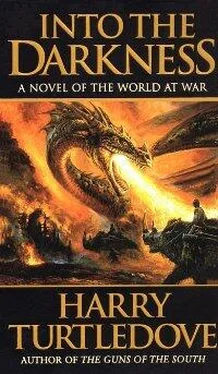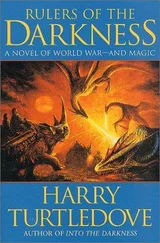But all he did was grunt again. “Sounds about like what you would have deserved,” he said. “Were you as clever then as you were with me just now?”
“I’m afraid so, sir,” Istvan admitted, his voice mournful. One way to duck punishment was to sound as if you’d already figured out you’d been a cursed fool.
It didn’t always work. This time, it did. Borsos turned away from him and aimed the forked staff at another Obudan fishing boat. It quivered again. As far as Istvan was concerned, the rod acted the same way for the second boat as it had for the first. That was why Borsos was a dowser and he wasn’t. The newcomer to Obuda pulled out a pen and tablet and scribbled some notes.
“What are you writing, sir?” Istvan reckoned it safe to remind Borsos of his existence. And he truly was curious. Unlike a lot of the young men from his valley, he could read and write, provided no one expected anything too hard along those lines from him.
“I’m beginning to compile a distance and bearing table,” the dowser replied. “I have to do that every place I go, for the waters are always different, and I get a different feel in the rod, depending on the waters.” He raised an eyebrow. “And if you crack wise about the feel your rod gives you, soldier, I’ll kick your arse off this beach and into the ocean. Have you got that?”
“Aye, sir.” Istvan made himself into the picture of innocence—no easy feat. “I didn’t say a thing, sir. I wasn’t going to say a thing, sir, and you can’t prove I was.”
“And a good thing for you I can’t, too.” Borsos pointed to the pack on Istvan’s back. “Turn around, if you please. I want to get something out of there.”
“Aye, sir,” Istvan repeated, and turned his back on the dowser. He suspected Sergeant Jokai had assigned him as Borsos’s beast of burden to make his life miserable. There, for once, the sergeant had miscalculated. Istvan enjoyed being able to shoot the breeze with the dowser, even being able to pick his brain a little, more than the ordinary routine of soldiering. Lugging Borsos’s equipment about was the price he paid for the privilege.
Borsos rummaged through the pack till he found whatever he was looking for. After the dowser closed up the oiled-leather pack, Istvan turned back around to see what he’d taken. Borsos was stripping the bright copper wire from most of its length of his dowsing rod. He replaced it with wire with a green patina.
Seeing Istvan’s eye upon him, he condescended to explain: “I think the greened wire here will give me better accuracy for a couple of reasons. For one, its color, like that of the sea, enhances the effects—both positive and negative—of the law of similarity. And, for another, it got that color by being soaked in seawater. That also gives it a greater affinity for the ocean here.”
“I see,” Istvan said, which was more or less true. “If all that’s so, though, sir, why didn’t you have the sea-soaked wire on the rod from the start?”
Borsos’s eyes were green as the wire he’d wrapped around the rod. They widened slightly now. “You’re not a fool, are you?” the dowser said in some surprise. “I didn’t have that wire on the rod because I’ve been doing lake work, and because, as I said before, they rushed me out here in a tearing hurry. I didn’t have the chance to adjust everything perfectly.”
And, unless I miss my guess, you were hoping the regular wire would do well enough. But Istvan didn’t say that out loud. He’d already tried Borsos’s patience once. He might not get by with it twice.
The dowser aimed the forked staff at the Obudan fishing boats once more. He nodded, as if he’d proved himself right. Then he scrawled more notes on the pad. “I did think so,” he said, more to himself than to Istvan. “The correction factor makes enough difference to be worth taking into account.”
“I’m glad you did it, then, sir,” Istvan said.
His speaking recalled him to the dowser’s mind. “Magecraft isn’t like carpentry, soldier,” Borsos said. “If you don’t vary your methods depending on where you are, you won’t get the results you should. My own view is, the laws of magecraft change a little, too, from one place to another.”
“How could that be?” Istvan asked. “A law is a law, isn’t it?”
Borsos was aiming the dowsing rod at yet another little fishing boat, and didn’t answer right away. At last, he said, “Carpentry just deals with things. Magecraft deals with forces, and some forces have minds of their own. If you don’t keep that in your own mind, you may start out to be a mage, but you won’t last long in the craft. Everyone will tell your widow and your clan head how sad it was you had an accident.”
“I see,” Istvan said again. What he thought he saw was the mage making his work out to be harder and more dangerous than it really was. A carpenter might do something like that, or a blacksmith. Soldiers would do it, too, especially when they were bragging in front of civilians. Istvan knew how deadly dull most of a soldier’s life really was.
Farmers, now, farmers never made their work out to be harder than it was. Istvan understood why, too, having grown up on a farm. No matter what a farmer said about his work, he couldn’t make it seem harder than it was.
Borsos pointed the rod due west. Seeing no fishing boats in that direction, Istvan asked, “Are you searching out past the horizon, sir?”
“That’s right.” The dowser’s head bobbed up and down, very much as his rod was doing in his hand. “I can feel boats out there—out farther than I can see, I mean—but they all move like the fishing boats I can see, so I don’t have to worry about them much. If I felt them heading straight toward this island from out of the west, I’d be shouting my head off.”
Istvan pointed to a dragon wheeling high overhead. “They’re on watch up there, too,” he remarked. His stints with dragons had given him a certain sympathy with—and for—the men who flew them. He wondered whether Borsos had been sent out to Obuda because he was valuable or because some officer back on the mainland had had a brainstorm.
“They’re watching up there, too,” the dowser agreed. “They have their uses, but I also have mine. They can’t see at night, but I can still sense danger then. When winter weather closes down, they won’t be able to see so well by daylight, either. I don’t need good weather.”
“Ah,” Istvan said, one syllable that meant, Maybe he’ll be worth having here after all. Borsos laughed out loud, which embarrassed Istvan, for he hadn’t wanted the translation of that one syllable to be so obvious. Trying to make amends, he remarked, “There’s a place up in Sorong—the village, I mean, not the mountain—where the girls are friendly. I’ll take you there, if you like.”
“Duty first,” Borsos said, stern as if he were a true Gyongyosian warrior and not a dowser wearing the stars of rank to give him authority over ordinary soldiers like Istvan. “Duty first. But then…”
Pekka scribbled a calculation. With the inexorable logic of mathematics, the next step was plain before she wrote it down. She didn’t write it down, not then. Instead, she looked out the window at the snow dancing in the wind. In her mind’s eye, she saw not the next step, but where the whole sequence was leading.
“It does all fit together,” she breathed. “When you get to the bottom of it, the very very bottom of it, all of magic everywhere has the same essence.”
She couldn’t prove that, not yet. She didn’t know if she would ever be able to prove it. Seeing where the mathematics led and getting there were two different things. Even if she did get there, she didn’t know for certain what she might do with the knowledge. Leino’s magecraft was concrete, definite, practical; if her husband and his colleagues discovered something new, they could quickly apply it.
Читать дальше












